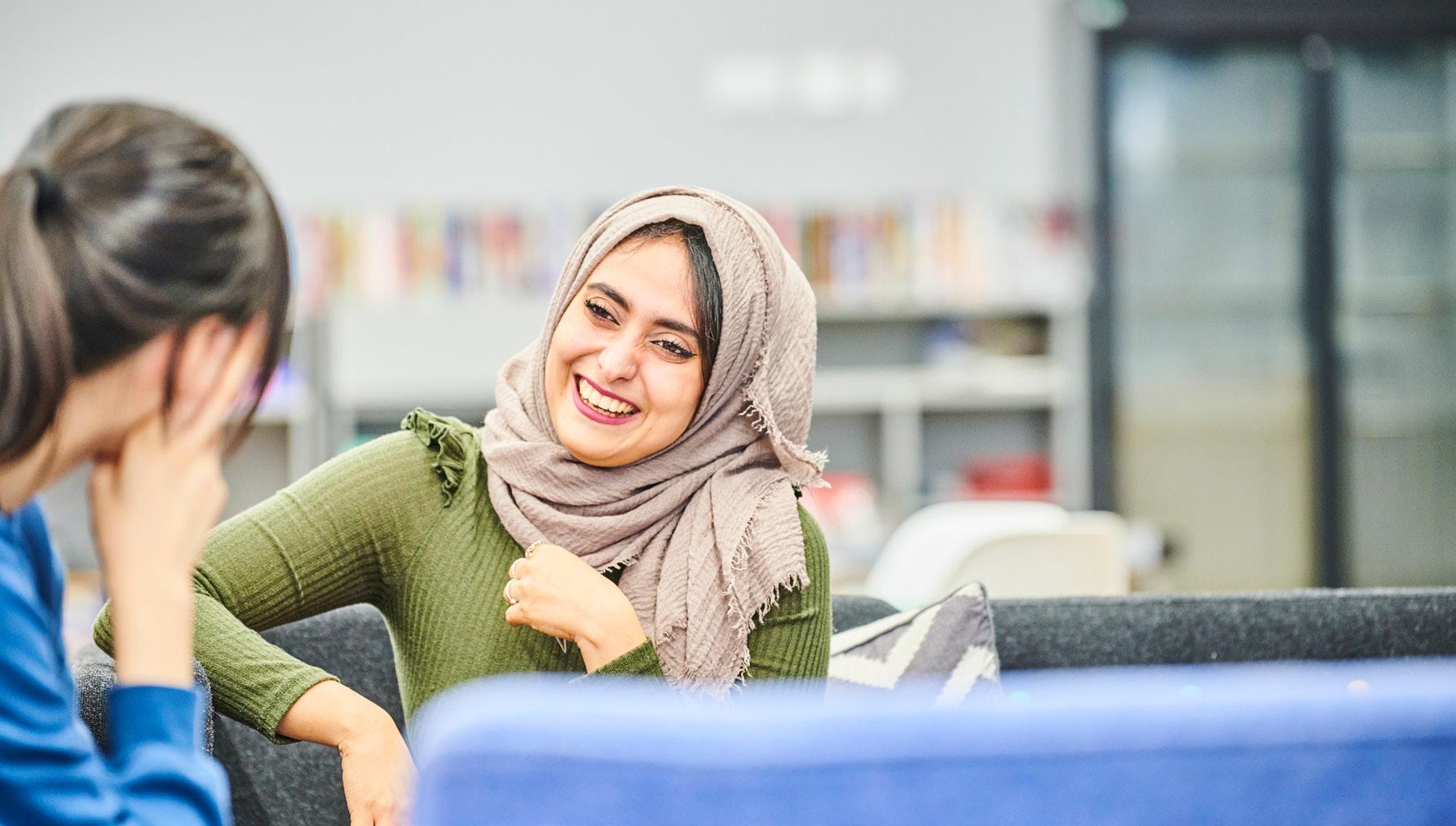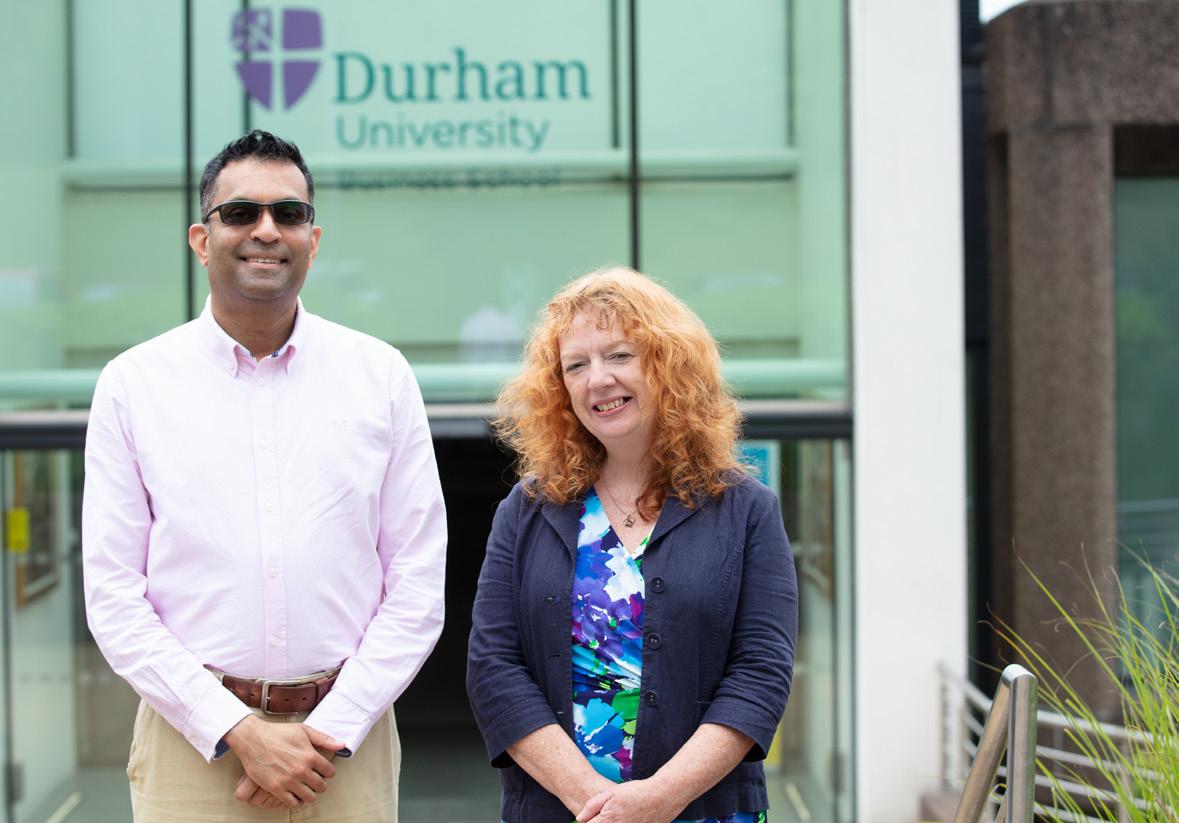
9 minute read
Interview with Cathy Cassell
In this Q&A, Executive Dean Cathy Cassell shares the highlights of her career to date, her plans for Durham University Business School and what makes Durham different.
For this issue, focused on responsible leadership, we thought there was no one better to interview than our Executive Dean, Cathy Cassell. Cathy was appointed in September 2022 after her previous role of Dean of Birmingham Business School. Below she highlights some of the key focuses for the coming years, as well as why hybrid working, diversity and sustainability are at the top of her agenda for the Business School.

Q Can you tell us some highlights of your career to date?
In my career up to date I’ve had plenty of highlights, both from a research perspective in my role as a Professor of Organisational Psychology, as well as from a business school management aspect, working as Dean at the University of Birmingham Business School for five years, and now moving to be Dean at Durham University Business School.
From the academic perspective, the opportunity to change the way in which we think about how we do research in my field, plus the impact of my research on diversity and inclusion has been a personal highlight, and the further impact my research has also had on wider industries too.
Whilst from the business school management perspective, the opportunity to see others flourish and personnel develop over time, and the role I have had in helping with that is a highlight. At Birmingham we also managed to successfully change the business school's strategy to focus more on responsible education and business and sustainability too, and leading the change was a highlight. One major indicator of this success was the jump up 18 places in the REF research positions in my time, which I am particularly proud of.
And now, my most recent highlight is moving into my role now as Executive Dean of Durham University Business School, where my next chapter begins. I get to meet new people, focus on a new business school and the challenges that come with that.
Q What are your plans for the next 12-18 months – especially in terms of the School’s global ambitions?
I am only very early into my time as Executive Dean of Durham University Business School, so while I have thoughts and insights on how we want to move the School forward, these are certainly not set in stone as of yet. For now, I’m enjoying getting to know the members of faculty, professional services, and students, and really understanding what challenges we face in the future and how we will steer towards taking these on.
My task now is to really get to know Durham and how it works, the culture of the School, etc., and focus on the future development of the School on the global stage. We certainly want to be as international as possible, as well as ensuring the faculty are continuing their great work in producing industry leading research in their key fields, and we’ll be continuing many of the successes the Business School has achieved previously.
But, as an academic, I think you never stop wanting to be a ‘thought leader’. Academics thrive on research and exploration, it’s in their blood! They’re always thinking, and they’re always interested. Currently, I’m really interested in researching the inclusive workplace.
Thankfully, my background in Organisational Psychology is a great tool for me to understand the importance of instilling the right leadership culture, which will be a key part of the future development of the School which, as Executive Dean, is my top priority.
My background in Organisational Psychology is a great tool for me to understand the importance of instilling the right leadership culture.
Q What do you think differentiates Durham?
I think what really characterises our programmes is that we really focus on trying to create those globally minded business leaders of the future, and that we do it in a number of ways. Whether through our diverse cohorts, the themes of our classroom-based learning and international modules, our in-class projects or our interactions with industry, everything is designed to develop those core leadership skills and knowledge base. We set our programmes up in such a way that students are able to learn from everybody – not just those charged with educating them but the industries they come into contact with, the alumni who support them and the classmates sitting alongside them.
We keep a close focus on tying what students learn to how it can be applied in industry. From providing students with an option to tailor their learning journey through our specialist subject pathways, to giving them real-life company challenges to provide solutions for and experience delivering those solutions in a boardroom styled exercise, we ensure students fully realise the importance and practicalities of their education so they can go on to be those change makers we wish to see.
Q How do you see the School’s online and innovation capabilities developing over the next few years?
We are constantly scanning the global landscape to see where the future of business education is heading and how new technologies can be leveraged to best effect.
We are fortunate in that one of our flagship professional programmes, the MBA, was offered online long before the pandemic. Our online MBA has been well recognised for its quality and effectiveness. This meant our technology, approaches to teaching, and willingness to experiment were significantly ahead of our competition.

Better tailored learning for in-person and online delivery, taking the best bits from both to enhance the study experience overall, is important. Our own hybrid executive education model reflects exactly this. We, therefore, expect this trend to continue, and we must continue to be investing in new technologies in the education sphere.
Whilst from a hybrid-working standpoint, I do not think we will ever go back to what was previously perceived as ‘normal’. A hybrid workplace is much better for people’s work-life balance, much better for people's mental wellbeing and is much better for organisations now too. The convenience and flexibility it affords are too great to go back.
When you look at it from a business education standpoint too, hybrid working allows us to really ensure we have the best of the best at our Business School. Allowing, not only our faculty but professional services staff too, to have a flexible, convenient hybrid workplace really does allow us to attract highly talented staff, to push the School further.
Q How do we truly impact the Equality, Diversity and Inclusion (EDI) agenda through business education?
We need to challenge more. We see great diversity among student bases and faculty too, but when you look at wider business, the levels of diversity at the top level are still shockingly low. We need to be more challenging when we see something that needs changing in the world. If there is one thing recent movements and protests have taught us, it is that it is not enough to just be passive when we see inequality, especially if it is not directly affecting us, we have to call it out and help to make a change. I think that’s where we need to do a lot of work within organisations to empower individuals to challenge behaviours that are unacceptable in the workplace. It takes everyone from all walks of life to improve the equity of all.
From a practical sense, we must ensure we continue to have our actions reflect our words –by having diverse cohorts and faculty, ensuring the case studies we use are diverse in all aspects, and we truly listen to each other to ensure that everyone associated with Durham University Business School feels included – we cannot change the wider world if that is not the case.

The idea of inclusion is certainly a crucial part of this debate around EDI. We can easily hire a female dean, or recruit lots of students from around the world or have initiatives focused on LGBTQ+ people, for instance. But if there is diversity without inclusivity, it does not work. We must ensure that people from all walks of life do not feel like the ‘other’ and that they feel included in their organisations. The feeling of belonging is crucial to an inclusive culture.
We must also bear in mind that diversity goes beyond gender and race. We’re becoming a lot more sensitive towards things like neurodiversity and the impact of that on the workplace, as well as mental health etc., but as a society we’ve still got so much more to learn when it comes to how we manage diversity.
The research I’ve done shows that what makes people feel like they’re in an inclusive environment is when the interventions leaders make are designed for everybody, as people feel they are being treated fairly. It’s more important that businesses create a culture of inclusion than it is to, for example, appoint women to senior jobs. It’s inclusion that needs to be the focus.
Q How important do you think sustainability is, and in what ways have business schools adapted this into their programmes?
I think it’s absolutely crucial. And, as business schools are responsible for training the next generation of business leaders, we must be at the forefront of solving the wicked problems the world is facing. It’s not enough to comment on those issues, we must be doing something actively to challenge them. This is something that our students now expect of us, and similarly, employers. One of the key challenges facing businesses is how we train people to deal with the challenges that being truly sustainable brings.
Again, it comes back to making a cultural change. If schools wish to make a real impact, they must embed a focus towards sustainability into their everyday thinking – not just what they teach but how they run their programmes and their campuses. Sustainability should be a starting point for every discussion.
Whilst sustainable and responsible leadership comes down to encouraging others; through succession planning, role modelling and development opportunities, so that you’re creating a standard of better leadership for the future. It starts with us – making sure our behaviours, priorities and actions match what we’d want to see in those who will come after us.
Click for more information on Professor Cassell and her research interests.










